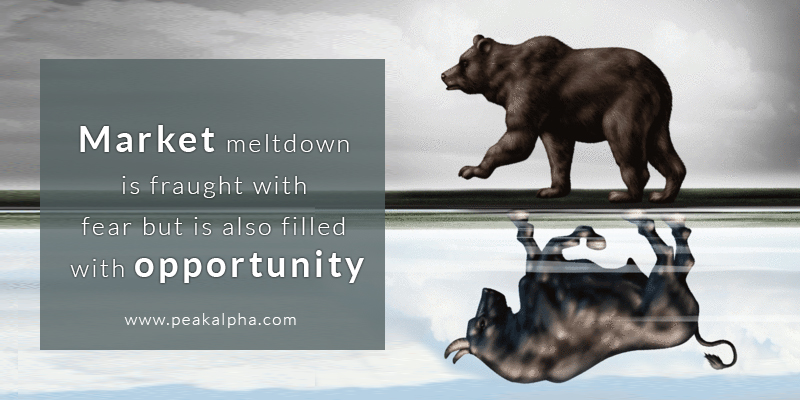- April 23, 2020
- Posted by: peakalpha2023
- Category: Livemint

Rarely do we come across such sharp corrections in such a short span of time
In the past few weeks, we have witnessed bizarre swings in the stock markets. Most global markets have fallen between 10% and 30%. We can’t help but feel a sense of déjà vu, because this steep fall is reminiscent of the market crash of 2008. On 13 March, the Sensex oscillated from -10% to 10% in a matter of hours. All this carnage is attributed to the pint-sized covid-19, which is bringing the world’s largest economies to its knees. So, what should investors do in situations such as these, which noted economist Nissim Taleb famously called “Black Swan” events?
If I had to sum up my answer, it would be, “Buy low or lie low”. If your portfolio is underexposed to equity, buy at these attractive valuations to lower your average cost. If your portfolio has the required allocation to equity, then do nothing. Whatever you do, don’t sell now. That is easy to say and hard to do when you see your portfolio dip sharply. But bear markets are followed by bull markets. Usually, the sharper the correction, the sharper the recovery. Even in 2008, those who stuck around were the ones who were rewarded handsomely because the market rebounded far more than it fell.
It is precisely in situations like these that one must ask oneself: If my average returns in equity thus far have been 8-10% and the market has corrected by 25-30%, do I have the opportunity to increase my average return to 12% or more? In most cases, the answer is yes. If you have time on your side and your major goals are decades away, then the best thing to do is to lower your average cost by continuing your SIPs or investing a lump sum via systematic transfer plans. What happens to the markets this week or the next month or the next year will become irrelevant then.
You have invested in equity because of the high returns. You are aware that high returns come with high risks, and that the risk goes away with time. If you hold high-quality stocks or equity funds, you must hold your faith too. If you panic and exit, you may miss out on the rewards that await others who stuck around.
Fear and greed are the two most powerful emotions that compel us to sell when the markets are low and buy when they are high. Investors must bear in mind that having the right asset allocation is key in moments such as these. Having cash reserves or risk-free assets help you tide through market volatilities. However, if an imminent goal is approaching, and you have not moved the assets required to secure that goal to safer assets, you may find yourself in a bit of a spot.
Some sectors are more affected than others. Though the economy will slow down and eventually recover, you may find yourself in a situation where you may be furloughed. Stow away some cash these next few months and give yourself the runway to tide through at least a year of expenses. If you don’t do this, you may be forced to sell part of your equity portfolio at a loss to fund expenses.
Next, ensure you have adequate life and health cover. If you fall sick because of this virus or any other illness and you don’t have either corporate or private medical cover, you will be cleaning out your portfolio at the worst time.
Simplify your portfolio. The more complex a product is, the less you would understand it. Diversified mutual funds are a good way forward. They offer transparency, spread out your risk and let you invest systematically. Beef up your knowledge of these investments and you will be more in control of your money.
Remember that markets have crashed more than 10% in a matter of days about two dozen times in the last decade or so. Each of those crashes was followed by a rebound. Sometimes the rebound occurred in months, sometimes in a few years. If you wait for the rebound, you have already missed the opportunity.
A market meltdown is fraught with fear but it is also filled with opportunity. Rarely do we come across such sharp corrections in such a short span of time. No one knows how long the uncertainty will continue, nor do we know when the market will bottom out. So, the best thing to do is to stay true to your long-term goals. Be the master of your destiny and you will be better placed to control the outcome instead of letting fear control the outcome.
